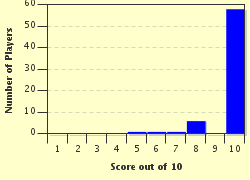
Esperanto - Some Basic Nouns Trivia Quiz
Don't know Esperanto? You may know more than you think! The words in Esperanto are largely based on European languages. The nouns end in "o", and for plurals, add a "j". See if you can match these Esperanto nouns to their English equivalents.
A matching quiz
by PDAZ.
Estimated time: 3 mins.
- Home
- »
- Quizzes
- »
- World Trivia
- »
- Languages
- »
- Esperanto
